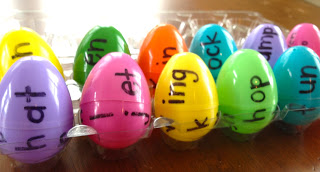Play is an important cognitive tool that allows for exploring and risk-taking without holding back. In the book, Sparks of Genius (1999), Robert and Michele Root-Bernstein describe play perfectly when they state, “play provides a fun and risk-free means of seeing from a fresh perspective, learning without constraint, exploring without fear” (p. 267-268). I believe that allowing children to play during literacy block is very important because it opens up their minds and fosters a deeper understanding.
An important aspect of Daily 5 is spelling/word work. It is essential that third graders learn how to spell and use their high frequency words correctly. Introducing spelling words can be viewed as a boring lesson. It’s probably a common conception to think of a teacher standing at a board with a pointer presenting spelling words. The teacher is going over the word letter by letter and having the student repeat verbatim. Well, not anymore!
My third graders can now play with their new spelling words before they are formally introduced to them using an app called Spelling City. I input the new words and the children play games to try and discover what they words are. Students can play independently or with partners. One of the games is called “Hang Mouse” and students are given the amount of letters a word has and they have to guess what letters create the word. There is also a word unscramble game and many more! While completing these games, students won’t even realize that they are utilizing pre-existing knowledge like spelling patterns and the knowledge of vowels and consonants.
After students have had some time to explore and play with their new spelling words, we will then more formally introduce them. However, I am not going to be the one to stand up front and introduce the words. I will choose students to come to up, play the role of teacher, and present the words. The student will then decide how he/she wants to present the word. They can use silly voices and accents, sing, use a megaphone, and/or choose from different pointers. All of this play will really help the students to remember their spelling words. It’s not some boring, routine lesson; this method engages the students and makes them interested in learning the words.
Robert and Michele Root-Bernstein mention how beneficial playing with words can be. With some of my students, we will kinesthetically learn our words by using a plastic egg. Students write a single letter on the smaller section of the egg and then write a word ending on the longer section. This allows the third graders to discover word families by turning the plastic egg!

I believe these introductory spelling activities to be very playful and meaningful. It puts a fun twist on learning high frequency words and the students will be engaged. I agree with the Root-Bernstein’s when they say, “What we do for fun rewards us many times over in unexpected ways when we apply it to some real-world problems…” (p. 265). Students will learn their spelling words in fun and unique ways, and they will feel rewarded when they’re able to use those spelling words in their writing and in the real world!
References:
Root-Bernstein, R. S., & Root-Bernstein, M. (1999). Sparks of genius: The thirteen thinking tools of the world’s most creative people. Boston, MA: Houghton Mifflin.
S. (2013, February 26). Make-your-own word family game. Retrieved December 03, 2016, from http://live-laugh-and-learn.blogspot.com/2013/02/make-your-own-word-family-game.html



